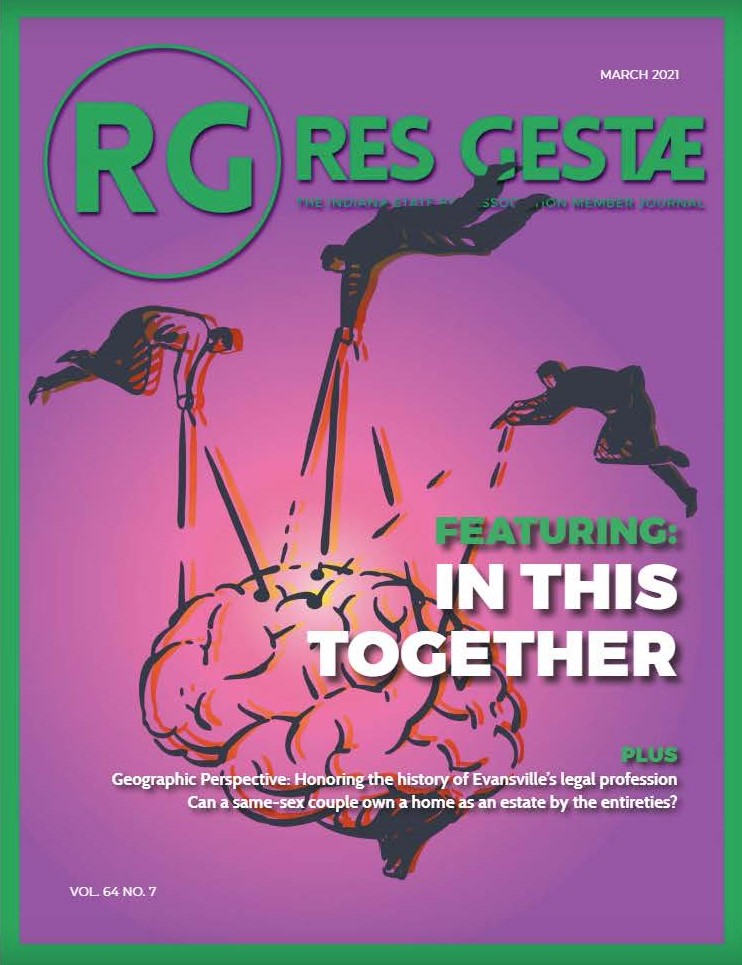
This is an article that our law firm authored for the Indiana State Bar Association. The article was published in the March 2021 issue of Res Gestae magazine.
Forms of Co-Ownership of Real Property
Many married couples elect to hold title to real estate as an “Estate by the Entireties,” which is a form of joint tenancy with rights of survivorship. Tenants in common, by contrast, do not have rights of survivorship. A married couple who purchases a home together presumably holds title as an “Estate by the Entireties.” If one spouse passes away, the other spouse becomes the sole surviving owner.
In addition to the right of survivorship, the Estate by the Entireties provides statutory protection from the execution of a judgment against one (but not both) of the spouses. Indiana Code Section 34-55-10-2(c)(5) exempts from execution property of a debtor domiciled in Indiana constituting “[a]ny interest that the debtor has in real estate held as a tenant by the entireties. The exemption under this subdivision does not apply to a debt for which the debtor and the debtor’s spouse are jointly liable.”
Conflicting Presumptions Under Indiana Law
The presumption created by Code Section 32-17-2-1 is that a deed conveying title to two or more persons creates a tenancy in common, rather than a joint tenancy. That presumption in favor of the tenancy in common seems to be flipped on its head, however, when two real estate transferees are husband and wife. Under Code Section 32-17-3-1, there is a statutory presumption in favor of the Estate by the Entireties, when a husband and wife purchase real estate or lease real estate with an option to purchase.
So which presumption applies to a same-sex married couple purchasing real estate?
The Indiana Code defines the “Estate by the Entireties” as real property owned by “husband and wife.” You will not find the phrases “husband and husband,” “wife and wife,” or “same-sex couple” in the relevant parts of the Code.
It is our opinion that the Equal Protection Clause of the U.S. Constitution and the Privileges and Immunities Clause of the Indiana Constitution would require the courts to extend the benefits of the Estate by the Entireties to same-sex married couples. See, for example, Henderson v. Box, 947 F.3d 482 (7th Cir. 2020) (extending birth certificate presumptions to same sex couples). If Sub-section 34-55-10-2(c)(5) were ever challenged on constitutional grounds, the courts would have three options, to find either that the Code-
- Constitutionally favors opposite-sex couples,
- Is unconstitutional and unavailable to all married couples, or
- Is unconstitutional to the extent it applies only to husbands and wives.
Considering that the federal courts have consistently extended to same-sex married couples statutory rights and privileges previously reserved for opposite-sex married couples, it would seem likely that the courts would find Sub-section 34-55-10-2(c)(5) unconstitutional, to the extent the Estate by the Entireties is limited by the phrase “husband and wife,” and would extend and apply all statutory rights and privileges of the “Estate by the Entireties” to any real property owned by any married couple, regardless of the sex of the couple.
Practice Warning
This article represents our best guess as to how the courts would address these issues. We do not recommend that estate and asset protection planning attorneys presume that the Estate by the Entireties applies to same-sex couples. Attorneys should use other tools to assist same-sex couples in achieving their desired planning results.